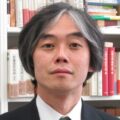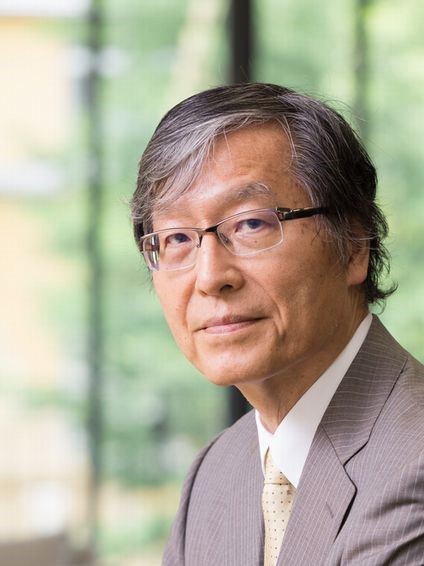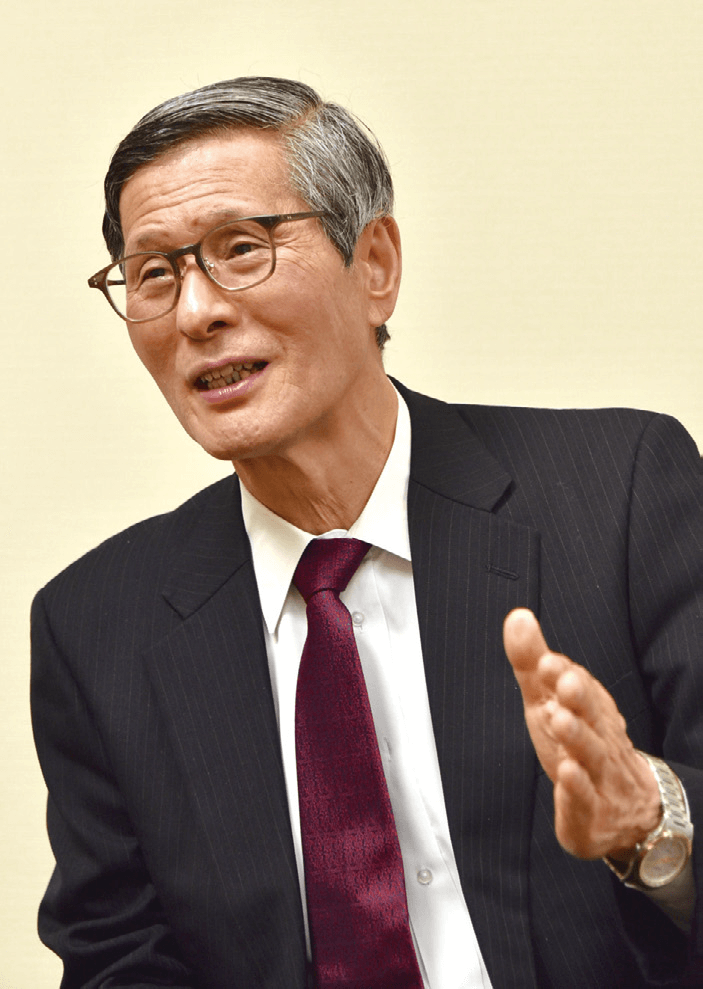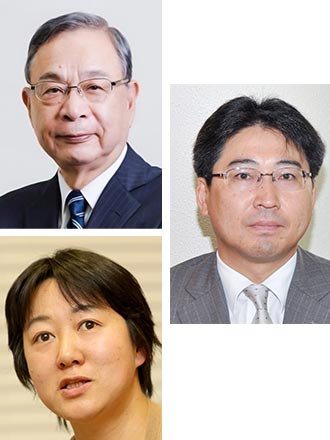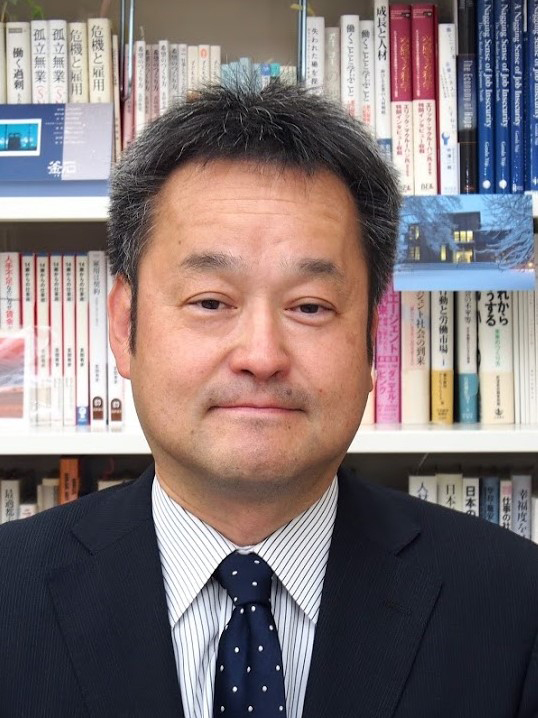Chief Cabinet Secretary Suga Yoshihide’s “Plan for the New Administration”: The COVID-19 National Crisis: A Political Vacuum Is Impermissible
Suga Yoshihide, Cabinet Chief Secretary (currently Prime Minister of Japan)
Editor’s note: Following the sudden resignation of Prime Minister Abe, Chief Cabinet Secretary Suga Yoshihide (now prime minister) outlined his “Plan for the New Administration” in this article published in the run-up to the LDP presidential election held to replace Abe.
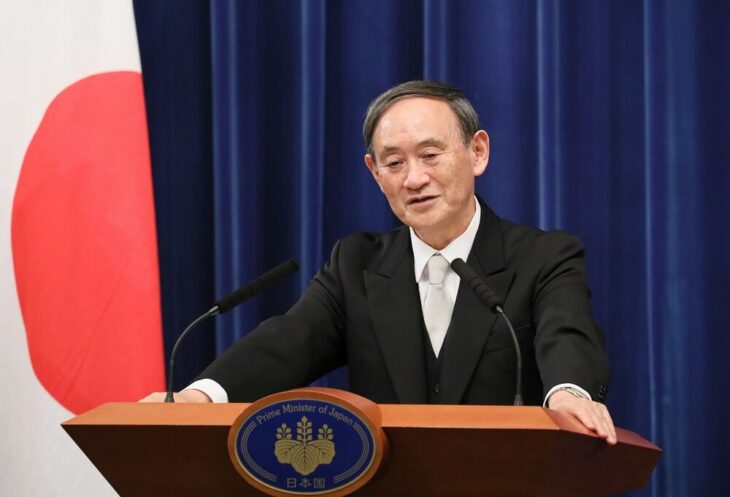
Suga Yoshihide, the New Prime Minister of Japan at the press conference for the inauguration of the Suga Cabinet on September 16, 2020
Photo: Cabinet Public Relations Office
As Japan is currently facing a national crisis in the fight against COVID-19 and leadership is needed to deal with the challenge of the compatibility between preventing the spread of infections and socio-economic activities, Prime Minister Abe Shinzo suddenly announced his resignation for health reasons. I can only imagine what regret the prime minister must be feeling as he steps down from the great mission of commanding the troops.
Right up until Prime Minister Abe announced his resignation, I was saying that “I’m not thinking about running.” The question was about the Liberal Democratic Party (LDP)’s presidential election in 2021 and since it is the chief cabinet minister’s job to support the prime minister until the end, it was only natural that “I wasn’t thinking about running.”
However, everything changed with the sudden resignation announcement. There is not a moment to waste in our response to this national crisis, so a political vacuum is impermissible. Someone has to succeed him. Is this something I should do? I gave this question careful thought. Ultimately, I made the decision to take on this difficult situation and run for election, giving it everything I have, in order to carry on the initiatives that the prime minister has been advancing as well as make further strides ahead.
Our most urgent task is how to weather the fight against COVID-19. We absolutely have to prevent the kind of explosive infectious spread that we have seen in Europe and the Americas. It goes without saying that our priority is protecting the lives and health of all citizens. Nonetheless, unless we achieve a compatibility between preventing the spread of infections and socio-economic activities, the daily lives of citizens will come to a standstill. Japan and other countries are struggling to achieve this compatibility, but it really is a “political responsibility.”
The GDP annual rate for April through June 2020 was minus 27.8%, the biggest drop in our history. Just looking at this figure, it is clear that we must do what we can to avoid another all-out restriction of socio-economic activities. Standing closest to the brink of collapse is the tourism industry, which has long supported our regional economies. The industry employs some 9 million people in hotels and traditional inns as well as buses, taxis, food, souvenir shops, and other businesses, but there was a period during which hotel occupancy rates dropped to around 10%.
It was in response to this that the Abe administration started the “Got To Travel campaign” based on the advice of experts. Hotels and inns with proper infection countermeasures in place were given support for accommodation charges. At least 5.56 million people used this scheme in the month leading up to August 27, but we currently know of only six infected persons who made use of Go To Travel at registered hotels and inns.
When it comes to Go To Travel, it is true that we initially received some exceedingly harsh feedback, but I believe that we gradually gained public understanding. On the assumption that we can firmly implement the necessary infection countermeasures, my intention is to support the many industries that have been hit by COVID-19, including tourism and restaurants, to protect the lives of you the citizens.
“Regional Revitalization” Is a Top Priority
I was raised in the house of a strawberry farmer in a small village in Akita, and even as a child, I wanted to build “a world where there are no migrant workers.” Even after becoming a politician, I never forgot the importance of the regions. During my time as Internal Affairs minister, I established the “hometown tax” system, which I had been preparing for a long time, as a way to help people realize their desire to contribute to the hometowns they were raised in.
Thus, if I am allowed to serve as president of the LDP, I wish to push “regional revitalization” as one of my top priorities. Seventy percent of Japanese consumption takes place outside the Tokyo Metropolitan Area (one metropolis, three prefectures; Tokyo, Kanagawa, Saitama and Chiba Prefectures). Unless we can boost income in the regions and stimulate consumption there, it is impossible to keep the Japanese economy afloat as a whole.
Following the establishment of the second Abe administration in late 2012, I tackled “tourism” and “agricultural reform” as two pillars of regional revitalization. This is because I wanted to “energize the regional economies more,” especially in my work as chief cabinet secretary to attract more foreign tourists.
In the beginning, the bureaucrats at the Ministry of Justice and the National Police Agency were strongly opposed with the motivation that “the relaxation of tourist visa requirements will badly affect public order,” but was that really the case? I think everyone agrees that having more foreign tourists is positive in itself. This is why I first secured the support of the minister of Justice and the chairman of the National Safety Commission, and then spent less than 10 minutes to decide on the relaxation of tourist visa requirements in a group of five cabinet ministers that also included the minister of Land, Infrastructure, Transport and Tourism, who is in charge of the Japan Tourism Agency, and the minister of Foreign Affairs.
In this way, bureaucrats are brilliant, so they will move in the intended direction as long as politicians are clear about their policy. As a result, there was a rapid increase in foreign tourists from 8.36 million (2012) to 31.88 million (2019). There also was no negative effect on public order.
COVID-19 has put the tourism industry in an extremely difficult situation, but I still want to increase the number of foreign tourists as a way to build “vital regions.” This is my plan.
Even so, the effects of COVID-19 in the regions have not been exclusively negative. I believe that the spread of teleworking and other trends has actually boosted the potential of the regions. What is needed here is “digitalization.” There are still many areas in the mountains and on remote islands where optical fibers have yet to be installed. In the recent second supplementary budget, I took the initiative to secure a budget (50 billion yen) for installing optical fibers nationwide, including on remote islands. This should equip many regions with important infrastructure needed to do teleworking as well as conduct medical and educational activities remotely.
Politics that Ascertain the “Usual”
Throughout my political career, I have consistently attached great importance to being able to ascertain what the Japanese people consider “usual.” The world is still full of so many things that are “unusual.”
One example is cell phone charges. Despite being a “lifeline for the people,” charges for cell phones in Japan have been allowed to become some of the highest in the world, accompanied by complex contract systems. This was the reason for the legal reform initiative last year to lower the penalty for breaking a two-year contract midway from 9,500 yen to 1,000 yen.
Despite this, the three major carriers control 90% of the market and achieve high operating margins of about 20%. The average profit ratio for big companies is 6%, so there is still a lot of room for lower fees. This is also something we have to deal with.
Moreover, I am sure you will agree that one of the most “unusual” things in our country is the various inefficiencies and irrational effects of the government’s “compartmentalized administration.” Bureaucrats were opposed to both the hometown tax and the relaxation of visa requirements, but I was convinced that they would be beneficial to the lives of Japanese citizens and allow Japan to grow even stronger.
Saving More than 25 Trillion Yen
A recent experience that made me keenly aware of the government’s “compartmentalized administration” was the dam issue. It started with typhoon Hagibis in October 2019. Seeing the muddy streams of the Arakawa and Tama Rivers, I feared what enormous hit the economy would take if the embankments were to burst. We managed to prevent large-scale flooding in Tokyo, but some regions suffered large damages. I instructed the relevant ministries and agencies to look into flood-control measures to consider whether anything can be done in preparation for next year.
Having done this, I was told the following by the bureau director in charge at the Ministry of Land, Infrastructure, and Transport (MILT): There are 1,470 dams across Japan, but the only ones with flood-control measures in place are the 570 dams under the jurisdiction of MILT. The other 900 are dams belonging to power companies under the jurisdiction of the Ministry of Economy, Trade and Industry (METI) and dams for agricultural purposes under the jurisdiction of the Ministry of Agriculture, Forestry and Fisheries (MAFF), but such “water utilization dams” do not have any flood-control measures.
A perfect example of the harmful effects of the “compartmentalized administration.” This prompted me to set up a system where MILT can operate all dams during the typhoon season. As a result, the national dam capacity served by flood-control measures was doubled from 4.6 billion m3 to 9.1 billion m3. This is the equivalent of Yanba Dam in Gunma Prefecture times 50. Since it took fifty years and cost more than 500 billion yen to construct Yanba Dam, a simple calculation is that we are saving more than 25 trillion yen. I believe this has significantly reduced the risk of flooding downstream of dams.
Masuda Hiroya, the former Internal Affairs minister (from the former Ministry of Construction), was also kind enough to comment that “The dam issue straddling multiple ministries was a problem that only Chief Cabinet Secretary Suga could solve,” but it is the task of politicians to constantly take a citizen perspective and break down the compartmentalized administration.
In times of overcoming emergencies like natural disasters and COVID-19, I am certain that we will have to ask for further cooperation from all of you and the local governments. One of my long-held beliefs is that a country’s foundation is “help, mutual support, and public assistance.” First do what you can do yourself. After that, help each other in the local area and community. It is on that basis that the government absolutely must take responsibility and act. My goal is a country where the government can enjoy that kind of trust from the people. I intend to increase my efforts to steadily develop our response to the escalating flood disasters, thereby deepening the trust that exists between state, administration, and residents.
Further Solidifying the Japan–US Alliance
Meanwhile, there are those who say that diplomacy and security are my weak points. It is true that I have never served as Foreign or Defense minister. Even so, I have been involved in numerous diplomatic settings in my life. I spoke to Vice President Mike Pence during my visit to the United States in May last year and it reinforced my belief in the importance of the Japan–US Alliance.
I have made a lot of efforts in the Okinawa base issue, but Japan–US relations took a sharp turn for the worse following the lack of direction regarding the relocation of Marine Corps Air Station Futenma back when the government was led by the Democratic Party of Japan. What happened during that time? That was when South Korean President Lee Myung-bak first stepped on Takeshima Island and Russian President Medvedev in the Northern Territories. A Chinese fishing boat collided with Japanese patrol ships around the Senkaku Islands and, while the captain of the Chinese ship was arrested, he also had to be released. The cruel reality of foreign relations is that our neighbors are sizing us up, thinking that “Japan is nothing to be afraid of when they are distant from the US.”
This is why we have no choice but to further solidify the Japan–US alliance. Essential to this is that we make sure to keep our promises to the United States. In this sense, the fact that the government acquired Mageshima Island (Kagoshima Prefecture) in late 2019 was very effective. I think it will give us a range of benefits, such as the furnishing of about 2,500 m of runway and the capacity to train with carrier-based aircraft. As I was leading the negotiations to acquire the land, I received letters of thanks from the US secretary of Defense and many other people involved.
The American presence is likewise big in our relationship with South Korea. Prime Minister Abe was aware of this more than anyone else. The Japanese and Korean governments agreed that the comfort women issue had been “resolved finally and irreversibly” in late 2015, but considering how things had been in the past, it was not unthinkable that the Korean side would reverse that decision. This was why the prime minister gave instructions to set up a diplomatic route to have the American government issue a statement welcoming the agreement, thus acting as a “witness.” I felt that such “diplomacy to remove hindrances” is needed at times. Even so, I never expected Japan–Korea relations to go awry this quickly, but I am certain the United States as the “witness” is well aware of whether it is Japan or Korea that is moving the goal posts.
When it comes to China, Chinese government vessels have recently become more active in their incursions into Japanese territorial waters around the Senkaku Islands, and the situation is undoubtedly serious. Since many regions have strong economic ties with China, it is crucial for us to assert what needs to be asserted while also facilitating constructive response to each and every unresolved problem.
As the security environment around Japan grows more uncertain, it is clear that the presence of the US is contributing to regional stability. This is yet another reason why we have to further strengthen the Japan–US Alliance.
Of course, the relationship between Prime Minister Abe and President Trump, who referred to each other as “Shinzo” and “Donald,” was a special one that is not easy to replicate. Even so, I do take pride in that I actually made some contributions to the building of that relationship.
I do not think there was anyone in the Ministry of Foreign Affairs who anticipated Mr. Trump’s victory in the presidential election in November 2016. However, I was still thinking that we ought to build a relationship with Mr. Trump’s side too. That is why I dined together with a certain visitor to Japan in October before the election, who would later become a key person in the Trump administration. At the same time, I looked into “honeyed words” that might appeal to Mr. Trump. I cannot give details, but I heard that when the prime minister called to congratulate him right after his victory, Mr. Trump was delighted to hear him say that word.
What I want to emphasize in foreign relations is this “overall perspective.” In other words, it is the crisis management ability that allows us to prepare for worst-case scenarios. If we can utilize that ability, then we should be able to deal with a range of situations. I am certain of this.
To Not Engage in “Factional Backroom Wheeling and Dealing”
There are those who criticize this presidential election, calling it “factional backroom wheeling and dealing,” but that completely misses the mark. To begin with, I have recently made a point of being consistently non-factional.
I believe the LDP factions play a variety of roles in terms of human resources and policy, but personally, I have worked to establish something akin to a study meeting to ensure that young Diet members without factional affiliation are not disadvantaged in personnel matters, particularly following the creation of the second Abe administration. The group has about fifteen members and they are all politicians who have worked their way up, just like me. They also asked me to run this time, so I am hoping that I will be able to meet their expectations.
At the press conference where Prime Minister Abe announced his resignations, he also set forth new anti-COVID-19 measures in anticipation of the seasonal influenza, including a drastic expansion of PCR testing. We need people who can implement such measures. If it is so that I receive the support of the party, then I think a reason for that is that people want Suga who was involved in the anti-COVID-19 measures with Prime Minister Abe, also from a standpoint of political continuity.
As the chief cabinet secretary, I met with Prime Minister Abe on a daily basis, and I notified him of my running for election as part of that. But we did not have any special exchange about this. To begin with, the prime minister is of the opinion that it would be strange for the person retiring to designate who he wants as his successor. Even so, since we were both involved in the anti-COVID-19 measures, I think the prime minister was happy to hear about my running.
Prime Minister Abe previously commented in an interview that “The problem with Prime Minister Suga is that he won’t have Chief Cabinet Secretary Suga.” I repeat myself, but since my aim was never to become prime minister, I also never thought about training a “right-hand man.” Having said that, there is no way I can ignore the current national crisis.
I believe Aso Taro, the deputy prime minister, agrees with me. Someone has to carry on the anti-COVID-19 measures. The persons who understand Prime Minister Abe’s strong wishes the best are Mr. Aso and I, who continuously supported the Prime Minister during the last seven years and eight months. This is why I think Mr. Aso would agree with what I am trying to do.
Remembering the Words of Mr. Kajiyama
The first time I was elected as a member of the House of Representatives was in 1996, but the person whom I have considered my “political mentor” since that time is the late Kajiyama Seiroku, who served as chief cabinet secretary in the Hashimoto Ryutaro Cabinet as well as LDP secretary-general. When Mr. Kajiyama withdrew from the faction (the Obuchi [Keizo] faction) and stood as a candidate in the 1998 LDP presidential election, I had also been elected only once and left the faction together with Mr. Kajiyama with an all-or-nothing determination, going around the party to garner support.
Right after the first time I was elected, Mr. Kajiyama gave me words of strong encouragement that still resound in me. “The politician’s job is to cover the people’s keep. Study hard to find out how you can do that. I’ll introduce you to all kinds of connections in business, academia, mass media, and the bureaucracy.” The expression “cover their keep” was very typical of Mr. Kajiyama, but what he meant was that you need to speak to a wide range of people with different perspectives and insights in order to do policymaking that can support the lives of the people. I thought he was entirely correct, and so I have done my best to speak to all kinds of experts in different fields as a way to educate myself.
He also told me this.
“You became a politician at a difficult time. It’s not difficult for politicians in a government party to get the people’s support when the whole country is growing. I’m a politician from good times like that. Yet from here on, the population will shrink and that’s enough to cause deflation. We’ll need policies that impose burdens on the people. The politicians of the government party will have to explain this necessity to the people and make them understand it.”
Just like Mr. Kajiyama said, Japan is grappling with a decreasing birthrate, an aging population, population decline and a host of other problems. To resolve these problems, the politics need to have a clear direction and we need to ask for the cooperation of all citizens. However, in order to do this, we politicians also need to be fully accountable to you.
If we look back on history, there have been so-called scandals where administrations failed to be accountable and were caught in serious predicaments. I do not have any such scandals. Throughout my thirty years of being a politician since I was first elected as a member of the municipal assembly at age 38, I have clearly taken responsibility for my mistakes.
Where There’s a Will, There’s a Way
Eight years ago, I was fighting the then LDP presidential election filled with the desire to once more make the politician Abe Shinzo the prime minister. Since that time, my aspirations have been the same as those of the prime minister. That is why I basically want to continue the work that the Abe administration was doing, such as building a country where all citizens are able to shine.
Yet things have also changed due to the economic crisis caused by COVID-19, creating a need for structural changes, for example in connection with supply-chain issues. This is why the first order of the day is to invest fully in anti-COVID-19 measures to protect employment and keep companies from going bankrupt. To borrow the words of Mr. Kajiyama, we “absolutely need to cover the people’s keep.” That is what my job is.
I am now 71 years old, but I am in perfect health. I have been in charge of crisis management as chief cabinet secretary for seven years and eight months. I took special care to manage my physical condition and keep an ordered lifestyle, for example by walking 40 minutes and doing 100 sit-ups every morning, for the sake of fulfilling my duties. It would please me if I could continue to make use of such experiences for the sake of the country.
My motto is “Where there’s a will, there’s a way.” Whatever the difficulties, there is definitely a way forward if you have a strong will. We will bring together the best minds in the country and devote all we have to take on this national crisis that is the fight against COVID-19. It is my hope that we can cope with the coronavirus completely, revitalize Japan for the post-coronavirus era, and take this country forward.
Translated from “Tokushu Abe Taijin no Shogeki—Posuto Abe ‘Saisho no Shikaku wo Tou’: Suga Yoshihide Naikaku Kanbochokan ‘Waga Seiken koso’—Korona kansensho toiu kokunan. Seiji no kuhaku wa yurusarenai (Questioning the “Ability to Be Premier” in the Post-Abe Period: Chief Cabinet Secretary Suga Yoshihide’s “Plan for the New Administration”—The COVID-19 National Crisis: A Political Vacuum Is Impermissible),” Bungeishunju, October 2020, pp. 94-101. (Courtesy of Bungeishunju, Ltd.) [October 2020]
Keywords
- Suga Yoshihide
- Chief Cabinet Secretary
- Abe Shinzo
- Prime Minister
- resignation
- politics
- economy
- tourism
- GoTo Travel
- regional revitalization
- agricultural reform
- digitalization
- cell phone charges
- compartmentalized administration
- dams
- flood disasters
- natural disasters
- Japan–US Alliance
- Donald Trump
- Japan–Korea relations
- China
- Senkaku Islands
- Kajiyama Seiroku
- COVID-19
